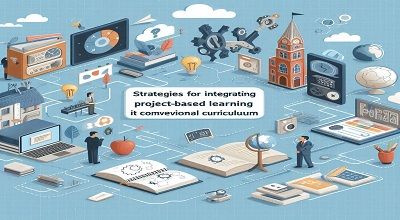Integrating project-based learning
Integrating project-based learning (PBL) into a conventional curriculum requires thoughtful planning and implementation. Here are some strategies to effectively integrate PBL into your curriculum:
- Align projects with learning objectives: Ensure that PBL activities are designed to address specific learning objectives or standards in the curriculum. This alignment helps students understand the relevance of the projects to their overall learning goals.
- Start small and gradually increase complexity: Begin with simple, short-term projects to introduce students to PBL concepts. Gradually increase the complexity and duration of projects as they become more familiar with the process.
- Provide clear guidelines and expectations: Communicate the goals, expectations, and evaluation criteria for each project. This helps students understand what is expected of them and how their work will be assessed.
- Foster collaboration and teamwork: Encourage collaboration among students by assigning group projects. That require them to work together to solve problems or complete tasks. This helps develop teamwork and communication skills, which are essential for success in real-world settings.
- Offer choice and autonomy: Provide students with opportunities to choose topics or themes for their projects. Allow them some degree of autonomy in how they approach and complete their work. This helps foster ownership and motivation.
Read More…
- Integrate real-world applications: Incorporate real-world scenarios and problems. Or challenges into projects to help students see the practical relevance of their learning. This can involve collaborating with local organizations or businesses, conducting fieldwork, or using technology to simulate real-world situations.
- Provide scaffolding and support: Offer scaffolding and support to help students navigate the project process. This may include providing resources, guiding questions, checkpoints, and opportunities for feedback and revision.
- Encourage reflection and metacognition: Incorporate opportunities for students to reflect on their learning and the project process. Encourage them to think about what they have learned, how they have grown, and what they would do differently in future projects.
- Assess both process and product: Evaluate students’ work based on both the process they used to complete the project (e.g., collaboration, problem-solving, critical thinking) and the quality of the final product or outcome. This provides a more comprehensive picture of their learning and growth.
- Celebrate and showcase student work: Provide opportunities for students to share their projects with others. Such as through presentations, exhibitions, or digital portfolios. Celebrating and showcasing their work not only builds confidence but also reinforces the value of their efforts.
